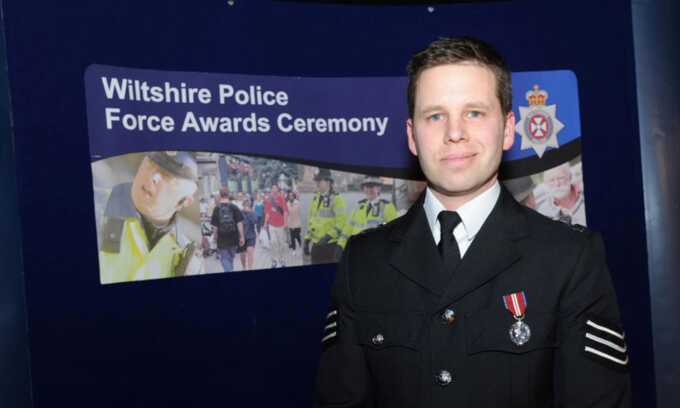Ex-police officer describes hallucinations after novichok poisoning at Sturgess inquiry

Nick Bailey, who went to Sergei Skripal’s home, describes visions of a ‘tsunami of pure heat and fire’ near his eyes
A former police officer who was poisoned in the Salisbury novichok attack has described the “nightmarish hallucinations” he experienced shortly after coming into contact with the nerve agent, including visions of a “tsunami of pure heat and fire” near his eyes.
Nick Bailey was affected after the nerve agent was smeared on the former Russian spy Sergei Skripal’s door handle in Salisbury in March 2018.
Giving evidence to the Dawn Sturgess inquiry on Thursday, the former Wiltshire police officer detailed the symptoms that took hold of him soon after a visit to the Skripal household.
He recounted how he first became aware of the incident. “I remember a log being generated and coming in, which was a report of two unknown people collapsed on a bench either semi-conscious or unconscious.
“It just piqued my interest a little bit because it was an unusual log to come in to.”
At first, Bailey knew nothing about Skripal’s background and suspected the incident to be drug-related. Uniformed officers were dispatched to Skripal’s home and began speaking to a neighbour who had a key to the property.
Around this time, Bailey was made aware of Skripal’s former spy links. “One of my team Googled Sergei Skripal’s name,” he said. “I vividly remember her saying: ‘Sarge, you’re going to need to come and see this.’” He walked over to see.
He was shown newspaper headlines that said Skripal was a former Russian spy who had been released as part of an international spy swap. This prompted Bailey and his team to contact the officer to stop them and the neighbour from entering Skripal’s home.
Soon after, Bailey said, a colleague contacted the control room and said: “A Russian spy has been poisoned.”
The next day, Bailey visited Skripal’s home, wearing a white forensics suit over his clothes, with disposable gloves, shoe covers and face mask. He said he was unsure if he had had personal protective equipment training.
He was the first person to enter the property, using the key supplied by Skripal’s neighbour. He told the inquiry he only remembered touching light switches, door handles and paperwork inside the property.
After the visit, he travelled to the hospital where the Skripals were being cared for. After obtaining blood and urine samples, he returned to Bourne Hill police station. At this point, the first symptoms began.
“I remember going to the bathroom and my eyes were little pin pricks,” he said. “I put that down to being tired and it being quite a stressful shift.”
After his shift, he went to A&E but was given the all-clear and sent home. He said his symptoms worsened overnight, with him feeling “incredibly hot” and sweating.
“I went down at around five in the morning because I was freaking out a little and my vision was impaired.
“Once I turned the lights on, everything was crystal clear and it was juddered as opposed to being a smooth motion of looking around. It was almost in frames – it was quite scary.”
He added: “I was having nightmarish hallucinations, like pure heat and flames right next to my eyes, as if you were able to get close enough to the surface of the sun. It was like a tsunami of pure heat and fire. That was terrifying.”
He visited A&E again where consultants told him there were nerve agents in his system. He remained in hospital for two and a half weeks.
Bailey appeared to nod and have tears in his eyes towards the end of his evidence when counsel to the inquiry, Francesca Whitelaw KC, asked: “It is fair to say the poisoning had a very significant mental and physical impact on you?”
The inquiry continues.
Read more similar news:
Comments:
comments powered by Disqus
































